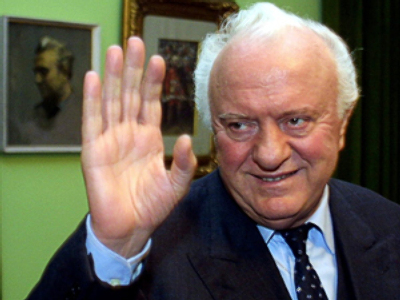 Eduard Shevardnadze, a former president of Georgia and Soviet foreign minister, died on Monday after a long struggle with illness, his personal assistant said.
Eduard Shevardnadze, a former president of Georgia and Soviet foreign minister, died on Monday after a long struggle with illness, his personal assistant said.
Shevardnadze, who was 86, played a vital role in ending the Cold War as Soviet foreign minister, and went on to lead his native Georgia in the stormy early years after independence before being ousted in street protests.
The last Soviet president, Mikhail Gorbachev, expressed sorrow over the passing of a “friend”, hailing him as an “extraordinary, talented person” who had done much to bring down the Berlin Wall and end the nuclear arms race.
“He was always quick to find a way of connecting with different people – with youngsters and the older generation. He had a bright character, a Georgian temperament,” he said, referring to Shevardnadze’s passionate nature.
Russian President Vladimir Putin offered his condolences to his “family, as well as the Georgian people”.
Shevardnadze’s assistant, Marina Davitashvili, told Reuters he had died after a long illness and said he had died at midday local time.
Loved by some but hated by others in his native Georgia after bringing stability but failing to tackle widespread corruption, Shevardnadze rarely ventured out of his hill-top residence during his last years.
As foreign minister under Gorbachev, Shevardnadze oversaw the thaw in relations with the West before the Berlin Wall came down and the communist Soviet Union was dismantled.
He was one of the intellectual fathers of “perestroika” (restructuring), the reform policy which Gorbachev said was conceived during a stroll along the shores of the Black Sea with his Georgian comrade.
In a sign of that controversial legacy, a Russian Communist Party official suggested Shevardnadze had been disloyal and must take some of the blame for the Soviet Union’s collapse. “Of course he is a historic figure, but he belongs to that set of people who will go down in history as the destroyers of the Soviet Union, pandering to Western efforts to do so,” the party’s deputy head Ivan Melnikov said in a statement.
After the end of the Soviet Union, Shevardnadze returned to Georgia to become president and brought some stability to the republic after a period of anarchy, when protesters toting Kalashnikovs prowled the streets.
He was toppled in the country’s 2003 Rose Revolution when Mikheil Saakashvili took over the presidency, unceremoniously bundled out of parliament by his minders when it was stormed by protesters.
“I see that all this cannot simply go on. If I was forced tomorrow to use my authority it would lead to a lot of bloodshed,” he said when he stepped down in November of that year. “I have never betrayed my country and so it is better that the president resigns.”Russian Deputy Foreign Minister, Grigory Karasin, praised Shevardnadze for “understanding the key significance for Georgia of having friendly relations with Russia” as president, drawing a contrast to his successor Saakashvili under whose rule Russia fought a war with Georgia in 2008.
Saakashvili said the struggle to define Shevardnadze’s legacy was a job for the historians.
“Historians will have to work for a long time to access more precisely his role,” he wrote on his Facebook page.
Reuters

Leave a Reply
You must be logged in to post a comment.